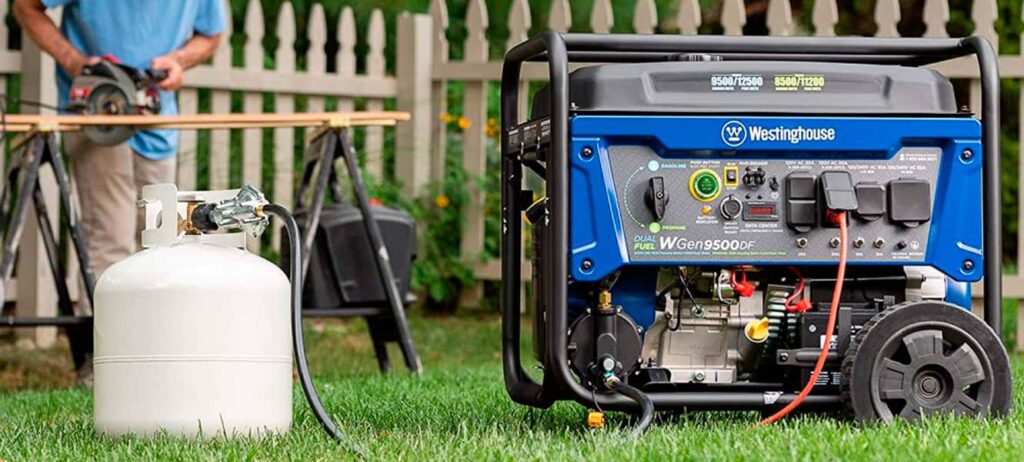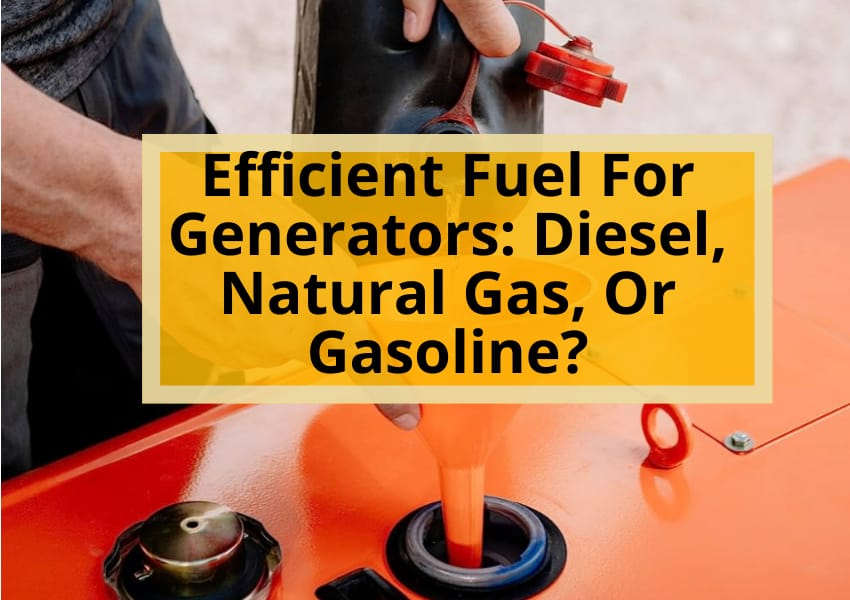Efficient fuel selection for generators is a crucial decision for industries and households alike. With the increasing demand for reliable and cost-effective energy sources, the choice between diesel, natural gas, and gasoline has become a complex one. The selection of fuel depends on several factors, including the frequency, duration, and load of the generator operation. Each fuel source has its benefits and limitations, which makes the choice of fuel a critical decision.
Diesel has long been the preferred fuel for generators due to its high energy density and efficiency. However, the cost and availability of diesel fuel have made natural gas and gasoline alternative options for fueling generators. Natural gas is a cheap and abundant fuel source, while gasoline is more widely available than diesel in some areas.
In this article, we will explore the pros and cons of diesel, natural gas, and gasoline as generator fuels to help you make an informed decision. We will compare these fuels based on factors such as cost, availability, efficiency, and environmental impact. The article will provide technical and analytical data to help readers understand the benefits and limitations of each fuel source and make an informed decision when selecting a fuel for their generator.

Factors to Consider
Various considerations must be taken into account when selecting the most efficient fuel for a generator. One of the most important factors is the load requirements, which refers to the amount of power the generator needs to produce to meet the demand of the appliances and devices it is powering. The load requirements can vary depending on the size of the generator and the number and type of appliances connected to it. As such, it is essential to select a fuel that can meet the load requirements without compromising the generator’s efficiency or lifespan.
Another critical factor to consider is the fuel availability. The availability of fuel can vary depending on the location and the type of fuel. Diesel fuel, for instance, is widely available in many areas, making it a popular choice for backup generators. Natural gas, on the other hand, may not be as readily available in some locations, which can impact its cost and availability. It is essential to consider these factors when selecting a fuel for a generator to ensure that it can be easily obtained and is cost-effective in the long run.
Comparison of Diesel and Natural Gas
When comparing between the two options, diesel generators operate at roughly 40% efficiency throughout their working range, while natural gas generators burn hotter and are less likely to encounter issues with unburned fuel.
Diesel generators use less fuel than natural gas generators, as they separately inject and compress fuel and air into the engine. Diesel fuel has a higher energy density than natural gas, with a peak energy density that is about three times more than that of natural gas. However, diesel fuel may be more expensive and less widely available in some areas, making natural gas a more practical choice in those circumstances.
Cost comparison is also an important factor to consider when choosing between diesel and natural gas generators. While diesel generators may have a higher upfront cost, they usually have a longer lifespan and may require less maintenance compared to natural gas generators.
On the other hand, natural gas generators may be more environmentally friendly and emit fewer pollutants than diesel generators. Ultimately, the decision between diesel and natural gas generators depends on various factors, including cost, availability, emissions, and maintenance requirements.
also read : Choosing The Right Inverter For Your Home
Maintenance and Environmental Impact
Regular maintenance and environmental concerns are important factors to consider when operating a backup power system, as neglect can lead to inefficiencies and negative impacts on the surrounding ecosystem. Diesel generators require more maintenance than natural gas generators due to their complexity, but regular maintenance is crucial for both types of generators to ensure optimal performance and longevity. Routine maintenance includes oil changes, filter replacement, and cleaning of the generator components. Load bank testing can also be used to verify the generator’s performance under various loads.
Another important consideration is emissions reduction. Diesel generators emit more pollutants than natural gas generators, including nitrogen oxides and particulate matter. To minimize emissions, diesel generators can be equipped with exhaust scrubbers or upgraded to meet Tier 4 emission standards. Natural gas generators, on the other hand, emit fewer pollutants and may even qualify for emission reduction incentives or credits. It is important to consult with local regulatory agencies to understand emissions requirements and incentives. Overall, regular maintenance and emissions reduction strategies can help improve the generator’s lifespan and reduce its impact on the environment.
| Maintenance Tips | Environmental Impact |
|---|---|
| Conduct regular generator maintenance, including oil changes and filter replacement | Diesel generators emit more pollutants than natural gas generators |
| Use load bank testing to verify the generator’s performance under various loads | Diesel generators can be equipped with exhaust scrubbers or upgraded to meet Tier 4 emission standards |
| Ensure the generator’s fuel supply is clean and free of contaminants | Natural gas generators emit fewer pollutants and may qualify for emission reduction incentives or credits |
| Consult with professionals for maintenance and repairs | Consult with local regulatory agencies to understand emissions requirements and incentives |
Frequently Asked Questions
What is the typical lifespan of a diesel generator?
The typical lifespan of a diesel generator is around 10,000 to 30,000 hours with regular maintenance requirements, such as oil and filter changes, cleaning the air intake, and checking the battery. Common breakdowns include fuel system issues, electrical problems, and overheating.
Can a natural gas generator be converted to run on propane?
Converting a natural gas generator to run on propane can be cost-effective, with conversion kits ranging from $300 to $1,500. However, it may also affect the generator’s performance and void the manufacturer’s warranty.
Are there any safety concerns with using gasoline generators indoors?
Using gasoline generators indoors can be dangerous due to the risk of carbon monoxide poisoning. Proper ventilation requirements must be met to ensure safe operation. It is important to follow manufacturer guidelines and never use generators indoors without proper ventilation.
How do inverter generators differ from traditional generators in terms of fuel efficiency?
Do inverter generators have better fuel efficiency than traditional generators? Inverter generators have a fuel consumption advantage due to their ability to adjust engine speed to match power demand, resulting in lower fuel consumption and emissions compared to traditional generators.
What are the emissions standards for diesel and natural gas generators?
Emissions standards for diesel and natural gas generators are regulated by various organizations worldwide. Compliance is required to reduce their carbon footprint. Diesel generators emit more particulate matter and nitrogen oxides than natural gas generators, which are generally considered cleaner.






